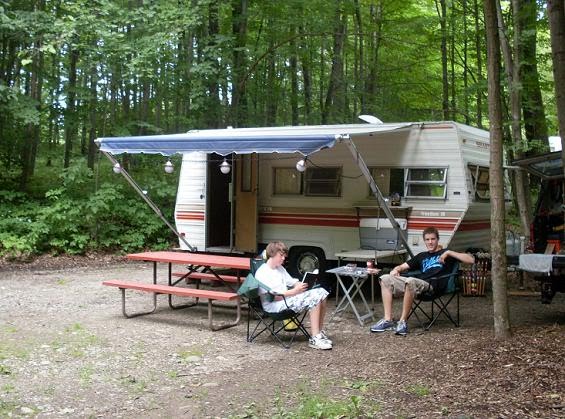by Raymond Alexander Kukkee, guest writer
Winter Camping, Part I: Essentials and Equipment
 |
| our Shasta camper trailer, deep in the snow |
Just mention Camping, and visions of warm sunshine, idyllic summer days and quality family time instantly appear in the minds of most camping enthusiasts. Warm-weather campers may consider winter camping impossible, too dangerous or a specialized, extreme sport best left to experts resting half-way up Mount Everest in a blizzard .
It is, however, reasonable and quite possible to camp in winter simply for the love of camping. Fresh air is offered by Mother Nature year round. Camping in the snow can be done quite comfortably, even when temperatures dip far below zero, if one is suitably equipped and necessary precautions are taken. Camping on wheels or not, consider these tips for comfort, fun, and safety. Let’s go winter camping !
Equipment and other considerations:
• If you normally go summer camping on wheels, ensure your camper is equipped appropriately with a heater or propane furnace. Carry an adequate supply of propane and test the furnace before heading out. Test to ensure pilot lights, regulators and ventilation systems are all in excellent operating condition.
• Avoid the temptation of using that convenient camper plumbing system if sub-zero conditions are expected. Such systems are at risk in winter. Potable water and gray-water tanks can freeze quickly in severe cold, seriously damaging uninsulated pipes and even the tanks themselves. Below freezing, even the simplest drain hoses and valves can become problematic as ice gradually builds up in them. Use a dry chemical toilet for those calls to nature instead .
• For tenting, double-walled or insulated tents are available. Snow is cold but it is also an insulator. Clear away snow and install a ground sheet or plastic canvas on the tent location, and bank up snow around the base of the tent. If snow conditions are suitable, you may even try building an emergency quinzy (quinzhee) or an igloo for fun. Northern peoples have lived in such structures for centuries.
• Use cold-weather Arctic-rated sleeping bags with thick foam ground pads (rated R-4-6) which will be warmer than sleeping on an air mattress.
• Use thermal underwear or “sweats” with hood to sleep in. Keep this clothing dry!
• Wear appropriate winter clothing and bring changes of clothing.
• Freeze-dried foods can be prepared quickly with a minimum of fuss on small burners, and insulated containers keep water-bottles and grocery supplies from freezing in all but the most extreme conditions. The use of paper plates eliminates the necessity of washing dishes.
• Include extra candles, flashlights and spare batteries, matches and fire starters. A single candle burning provides an amazing amount of emergency heat in a tent.
• To enjoy campfires, it may be necessary to bring dry wood with you. Depending on temperature and snow conditions, dry usable fire wood may not be easily collected in the wild. Don’t forget the axe and small bow saw.
• Maintain your cell phone for emergencies. In extreme cold, keep the phone warm in an inside pocket.
• Remember to pack a first aid kit, cameras, snowshoes, skis, and other equipment desired, including ice fishing gear and permits if planning some “hard-water fishing” in your area.
• Ensure your vehicle is in top condition. Bring along a fully-charged spare battery for your vehicle, gas line antifreeze, some basic tools and jumper cables just in case.
Winter camping can be challenging, but there are benefits--including cold fresh air, no biting insects, and fewer noisy boom-boxes. There is the element of personal satisfaction at having done something few people will ever experience. You may even find there are special “off-season” rates available at savvy all-season campgrounds that offer plug-ins and other conveniences. Wouldn’t that be cool?
Posted by permission from Raymond Alexander Kukkee. Read Raymonds's profile at Helium.com
_______________________________________________
Raymond is a good friend, fellow freelance writer, and hosts Incoming Bytes with his own brand of biting insight. When the two of us correspond, we generally sign off with our familiar "we like camping better." This Winter Camping article is exclusive to JCO (thanks, Raymond!); Part II will be posted later this week.
If you've done some serious sub-zero camping, we'd love to hear about your experience. Just leave a comment right here. ~Jim

.jpg)


+bigcrop.jpg)





+edit.jpg)





Jim, thanks, and don't forget your snow shovel... ":) Looking good!
ReplyDeleteWhoa! Winter camping sounds cool! Makes me want to do that this year! Usually, if I have a time, my friends and I go on a road trip. Recently, we've been thinking for something different for this year. We'd definitely do that this year! I think it's fun!
ReplyDeleteYou'd better hurry, or head North, Nita! Suddenly, summer's in the air in upstate NY--we're headed for 70+ today.
ReplyDeleteGreat to meet you, Nita. Thanks for stopping by.
It is so cozy to snuggle into a sleeping bag when you are camping. The sound of the trees rustling and the creek running by, what a great feeling! However, it isn't a great feeling if the bag you are sleeping in isn't comfortable! Make sure you get the proper weight sleeping bag. Even though it may be balmy and warm at home, remember that it is much cooler in the mountains. You will want sleeping bags that will be warm, but not too hot. Get a bag that is a medium to heavy weight, unless you are going to high elevations then you will want a heavy weight bag.
ReplyDeletecamping